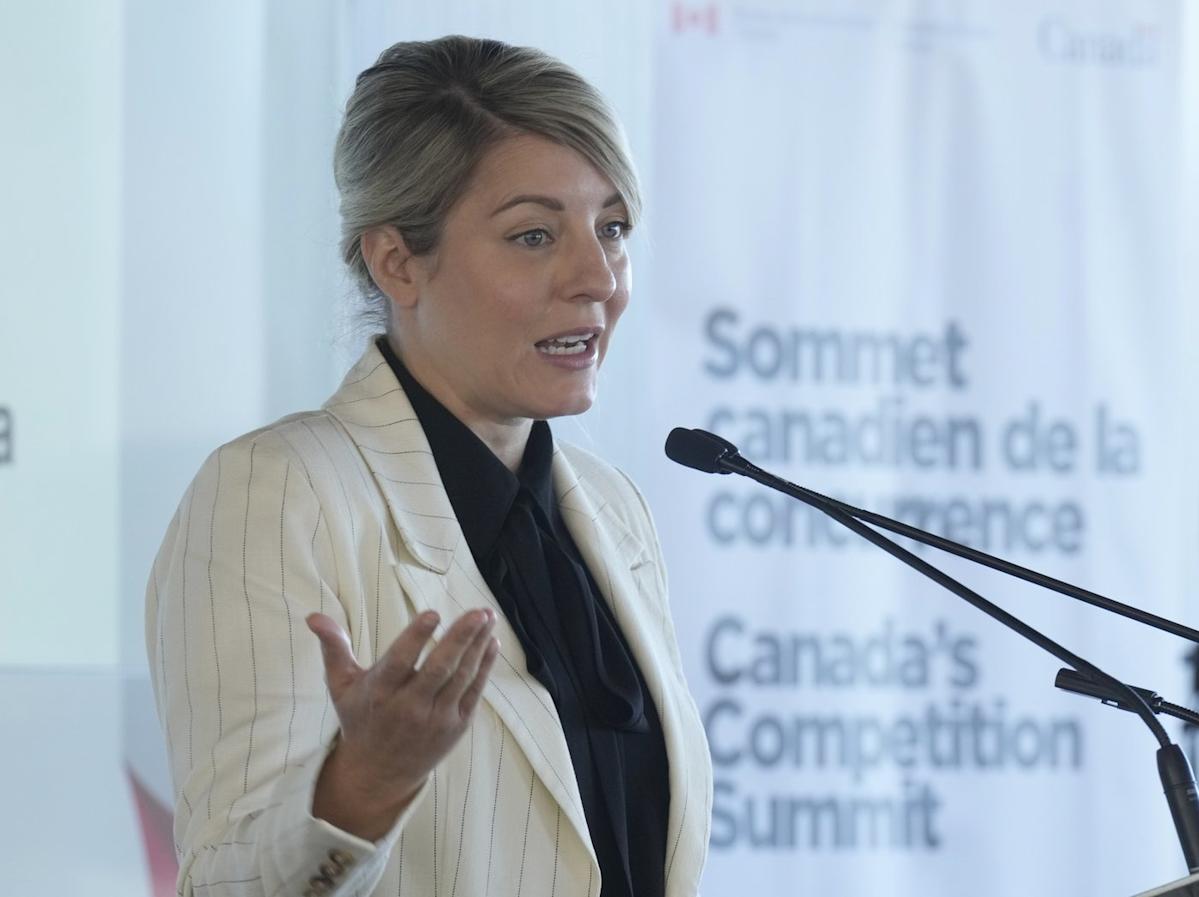OTTAWA — Ottawa will aggressively push competition between companies in a bid to ease the cost of living, Industry Minister Mélanie Joly said on Wednesday as she opened the Competition Bureau’s annual summit in Ottawa.
In her speech, Joly delivered an emphatic endorsement of more market competition in Canada.
“Let me be clear. This government will be hawkish on competition,” she said.
Joly argued expanding competition in Canadian industries such as telecom would give consumers more choices and offer a path to lower prices.
Speakers at the Competition Summit also pitched improving competitive forces and trimming red tape in Canada as a solution to flagging productivity.
Competition Commissioner Matthew Boswell said in his speech that boosting competition within Canada will make domestic firms more competitive on a global scale as U.S. tariffs and shifting trade flows threaten long-standing supply chains.
“Shielding domestic firms from competition doesn’t make them strong, it makes them complacent,” Boswell said. “If we want them to compete globally, they must face competition at home.”
The Competition Bureau acts as a watchdog for competitive dynamics in Canada and has examined concentration in the grocery and airline sectors in recent years.
Boswell said the latter study revealed adding a new carrier to an existing route can reduce airfares between two cities by an average of nine per cent.
“Competition is one of the most effective tools we can leverage to lower prices and improve products and services,” he said.
But adding new competitors to concentrated Canadian industries has long proven difficult for Canadian industry.
Boswell said the top issue keeping him and members of his office up at night is a stagnant rate of new businesses entering the Canadian market.
He pointed to red tape and prohibitive startup costs holding back entrepreneurs from starting the kinds of new businesses that bring innovation to the market and put pressure on incumbents.
Statistics Canada said in a February report that the level of federal regulation increased 37 per cent between 2006 and 2021.
As a result, StatCan said, real gross domestic product growth was 1.7 percentage points lower over that decade and a half while business investment was roughly nine per cent lower.
Licensing costs, ownership limits and excessive fees are common irritants keeping the rate of business creation low in Canada, Boswell said.
“These barriers don’t just slow entrepreneurs down, they lock them out,” he said.
Boswell said smart regulation should encourage new entrants to the market, not entrench and protect established players.
Story Continues
The commissioner also spoke Wednesday with Bank of Canada senior deputy governor Carolyn Rogers, who sounded the alarm on weak productivity rates in a speech last year.
Boosting productivity means increasing how much a business or worker can produce in a given period, usually by giving them better tools to do the job. Rogers said Wednesday that’s critical to growing Canada’s economy without inflationary impact.
Competition “greases the wheels” of productivity by pushing businesses to be better and invest in their operations, she explained.
“Economies that are always being pushed to be better are going to have better outcomes for customers,” Rogers said.
Rogers also warned about the need for balance in any push to cut red tape. She said safety regulation and innovation can be trade-offs for policymakers to consider.
Heading into the Liberals’ fall budget on Nov. 4, Prime Minister Mark Carney has touted plans to improve productivity in Canada by boosting federal infrastructure spending and attracting external investment.
The recently created Major Projects Office, for example, has a mandate to shorten timelines for regulatory approvals on big infrastructure projects down to a maximum of two years.
The federal Conservative party has long pushed for cutting red tape to speed up homebuilding and for the government to get out of the way of businesses wanting to invest in Canada.
The federal Treasury Board Secretariat launched a red-tape review in July that came back last month with almost 500 suggestions to streamline regulations.
Some of Ottawa’s recent efforts to improve competition in Canada revolve around the telecom sector.
Joly on Wednesday cited her August decision to uphold a regulatory decision that allows large telecom firms to offer services on the backs of their rivals’ networks as an example of a measure that boosts competitive forces in the sector.
“The ruling enables internet providers to compete today across the country. This means more choice, lower prices and better service offerings for Canadians everywhere,” Joly said.
In June, the Canadian Radio-television and Telecommunications Commission issued its final decision on that contentious matter, which pitted Telus Corp. against rivals Bell Canada and Rogers Communications Inc., and many smaller providers that opposed the framework.
Bell argued against the policy, saying it discourages the major providers from investing in their own infrastructure. Some independent carriers, suggested it would make it harder for them to compete against larger players.
Telus defended the policy as a way to boost competition in regions where it doesn’t have its own network infrastructure, and argued it would make telecom services more affordable.
The previous Liberal government gave the Competition Bureau new powers to levy heftier penalties, more closely scrutinize proposed mergers and compel financial documents from the subjects of its market investigations.
Last month, the bureau launched a market study of barriers for small- and medium-sized businesses seeking to access financing in a lending industry dominated by Canada’s Big Six banks.
Joly offered that study as an example of efforts that will help Canadian businesses grow and compete.
“My message today is clear: Canada is open for business, but we expect companies to compete fairly,” she said.
This report by The Canadian Press was first published Oct. 1, 2025.
— With files from Sammy Hudes in Toronto
Craig Lord, The Canadian Press

